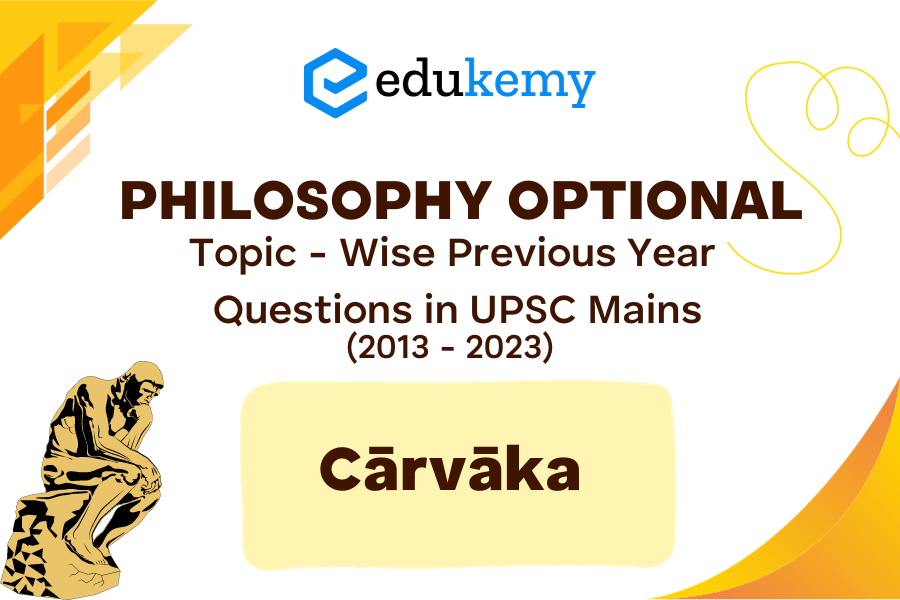
Are you an aspiring civil servant preparing for the UPSC Mains examination with philosophy as your optional subject? If so, you’re in the right place! In the ever-evolving landscape of the UPSC exams, the optional subjects play a pivotal role in determining your success. Among the plethora of options, philosophy is a subject that offers a unique and insightful perspective on life’s fundamental questions. It challenges your critical thinking abilities and provides a holistic understanding of various philosophical traditions. To excel in this subject, one invaluable resource is the previous year’s question papers, and in this blog, we’ll delve into a decade’s worth of questions focused on a fascinating and often-controversial philosophy – Cārvāka.
Cārvāka, also known as Lokāyata, is one of the lesser-explored yet profoundly intriguing schools of Indian philosophy. This materialistic and atheistic tradition questions the existence of the supernatural, advocating for a world where only empirical evidence is paramount. It’s a subject that has gained significance in the UPSC Mains over the past decade, and in this series, we will explore the range of questions posed to aspirants from 2013 to 2023. Join us in uncovering the philosophical debates, ideas, and nuances that have shaped Cārvāka philosophy’s presence in the UPSC Mains examinations, providing you with a solid foundation for your own preparation.
Contents
Cārvāka Philosophy – Previous Year Questions (UPSC CSE Mains History Optional)
1. “ The soul is nothing but conscious body.” What are the reasons for Carvaka in holding this view ? (2017/10)
2. What would be Carvaka’s view on Vyapti? Can this view beacceptable to theNaiyayikas? Give reasons for youranswer.(2016/15)
3. Explain the the arguments of carvaka to reject transcendentalentities.(2015/15)
4. “Limits of knowledge and world are determined by my senseperception”. Discuss this claim of Carvaka.(2014/10)
5. Why do Carvaka do not believe in the validity of inference ? Whatlogic do they give for their belief ? (2012/15)
6. On what basis does Carvaka reject the cause-effect relationship ?(2012/15)
7. Why do Carvakas reject the concept of Akasa. Discuss. (2011/30)
8. Just as the skepticism of Hume helped Kant to come out of hisdogmatic slumber, so also the Carvaka philosophy saved Indianphilosophy from dogmatism. Discuss. (2010/20)
9. Carvaka’s views on the nature of soul. Short Notes. (2007/20)
10. Discuss the theory of knowledge, according to Charvaka Philosophy.Notes. (2006/60)
11. Dehatmavada of Carvakas. Short Notes. (2004/20)
12. Charvak’s refutation of anumana is itself a process of anumana.Discuss. (2003/60)
13. State and evaluate critically Carvaka’s view that perception is theonly valid source ofknowledge. (2002/20)
14. The Charvak theory of consciousness. Short Notes. (2001)
FAQs
Q: Who is Cārvāka?
A: Cārvāka, also known as Lokāyata, was an ancient school of Indian philosophy. It is characterized by its materialistic and atheistic outlook. Cārvāka denied the existence of an afterlife, rebirth, and the existence of gods. Instead, it promoted a philosophy grounded in empirical evidence and sensory perception as the only means of knowledge.
Q: Are there any famous quotes attributed to Cārvāka?
A: Cārvāka philosophy does not have a comprehensive collection of famous quotes like some other philosophical traditions. However, one well-known principle associated with Cārvāka is “Yāvajjīvet sukham jīvet, rinam kṛtvā ghṛtampibet,” which can be roughly translated as “As long as you live, live happily; borrow money and drink ghee (clarified butter).” This maxim reflects the philosophy’s focus on living for the present and enjoying life without concerns for the afterlife.
Q: Is Cārvāka a religion?
A: Cārvāka is not a religion but a philosophical school of thought. It lacks religious aspects like worship, rituals, and a defined system of morality. It is more of a materialist and philosophical approach to life, emphasizing empiricism and skepticism, rather than a religious belief system.
Q: What are the criticisms of Cārvāka philosophy?
A: Cārvāka philosophy has faced criticism throughout history, primarily due to its rejection of spiritual and metaphysical elements. Critics argue that it promotes hedonism and lacks a moral framework. Additionally, some detractors claim that it disregards the significance of metaphysical and ethical questions, focusing solely on the material world.
Q: Who is Kushal Mehra and his association with Cārvāka?
A: Kushal Mehra is a modern thinker and podcaster who has gained recognition for his work on Cārvāka philosophy. He often discusses and promotes the ideas and principles of Cārvāka philosophy in the context of contemporary debates. While not a historical figure in the traditional sense, he has contributed to the revival and popularization of Cārvāka thought in the modern world, making it more accessible to a wider audience.
In case you still have your doubts, contact us on 9811333901.
For UPSC Prelims Resources, Click here
For Daily Updates and Study Material:
Join our Telegram Channel – Edukemy for IAS
- 1. Learn through Videos – here
- 2. Be Exam Ready by Practicing Daily MCQs – here
- 3. Daily Newsletter – Get all your Current Affairs Covered – here
- 4. Mains Answer Writing Practice – here

